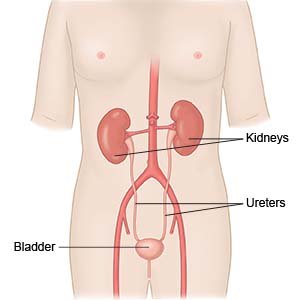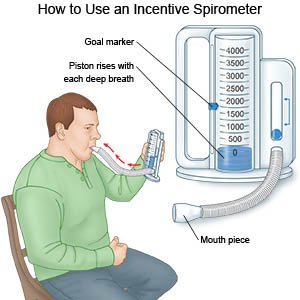Cystectomy with Ileal Conduit
Medically reviewed by Drugs.com. Last updated on Apr 6, 2025.
Cystectomy with ileal conduit is surgery to remove your bladder. Your surgeon will create a urostomy to help urine drain from your kidneys out of your body. A passage called an ileal conduit will be used to connect your kidneys to an opening in your abdomen. The opening, called a stoma, will be connected to a bag that collects urine.
 |
WHILE YOU ARE HERE:
Before your surgery:
- Informed consent is a legal document that explains the tests, treatments, or procedures that you may need. Informed consent means you understand what will be done and can make decisions about what you want. You give your permission when you sign the consent form. You can have someone sign this form for you if you are not able to sign it. You have the right to understand your medical care in words you know. Before you sign the consent form, understand the risks and benefits of what will be done. Make sure all your questions are answered.
- Medicines may be given to prevent blood clots or an infection caused by bacteria.
- General anesthesia will keep you asleep and free from pain during surgery. Anesthesia may be given through your IV. You may instead breathe it in through a mask or a tube placed down your throat. The tube may cause you to have a sore throat when you wake up.
During your surgery:
- Your surgeon will make an incision, usually near your belly button. He or she will disconnect the ureters from your bladder. Your bladder will be removed. Nearby tissue or organs may also be removed. In men, the organs include the prostate and seminal vesicles (glands near the prostate). In women, the organs include the uterus, cervix, ovaries, and fallopian tubes.
- Your surgeon will then remove part of your intestine. He or she will use this to connect your ureters to an opening in your abdomen (the stoma). Two small stents (tubes) will be placed inside the ureters to help urine drain while you heal. Your surgeon will close your incision with stitches or staples.
Drugs used to treat this and similar conditions
Omvoh
Omvoh is used to treat moderate to severe ulcerative colitis or Crohn's disease in adults. This ...
After your surgery:
You will be taken to a room to rest until you are fully awake. Healthcare providers will monitor you closely for any problems. Do not get out of bed until your healthcare provider says it is okay. When your healthcare provider sees that you are okay, you will be able to go home or be taken to your hospital room.
- You will be helped to walk around after surgery. Movement will help prevent blood clots. You may also be given exercises to do in bed. Do not get out of bed on your own until your healthcare provider says you can. Talk to healthcare providers before you get up the first time. They may need to help you stand up safely. When you are able to get up on your own, sit or lie down right away if you feel weak or dizzy. Then press let healthcare providers know you need help.
- Deep breathing and coughing will decrease your risk for a lung infection. Take a deep breath and hold it for as long as you can. Let the air out and then cough strongly. Deep breaths help open your airway. You may be given an incentive spirometer to help you take deep breaths. Put the plastic piece in your mouth and take a slow, deep breath. Then let the air out and cough. Repeat these steps 10 times every hour.

- Intake and output of liquids may be recorded. Healthcare providers record the amount of liquid you are getting and how much you are urinating. Do not flush your urine down the toilet unless healthcare providers say it is okay.
- Medicine may be given to manage pain. Medicines may also be given to treat or prevent an infection caused by bacteria, or to prevent nausea and vomiting. You may also be given medicine to decrease stomach acid or to make it easier to have a bowel movement.
RISKS:
Surgery may increase your risk for bleeding or infection. The stoma may become swollen or painful. Part of your intestine may bulge into the area around the stoma. Urine may leak where the ureters are connected to the section of intestine. Your ureters may also become blocked and not empty urine. Your intestines may stop working, and it may become difficult to have a bowel movement. You may get a life-threatening blood clot.
CARE AGREEMENT:
You have the right to help plan your care. Learn about your health condition and how it may be treated. Discuss treatment options with your healthcare providers to decide what care you want to receive. You always have the right to refuse treatment.© Copyright Merative 2025 Information is for End User's use only and may not be sold, redistributed or otherwise used for commercial purposes.
The above information is an educational aid only. It is not intended as medical advice for individual conditions or treatments. Talk to your doctor, nurse or pharmacist before following any medical regimen to see if it is safe and effective for you.
Learn more about Cystectomy with Ileal Conduit
Care guides
Further information
Always consult your healthcare provider to ensure the information displayed on this page applies to your personal circumstances.
